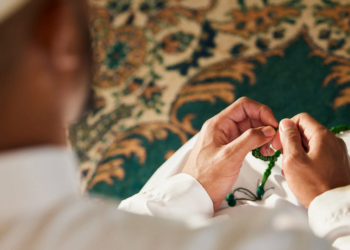No products in the cart.
What Is The Purpose Of Bedtime Prayers?
ADVERTISEMENT
This post contains paid and/or affiliate links. I make a small commission at no extra cost to you. Please see our Privacy Policy.
Bedtime prayers are a tradition in many cultures and religions. They help with spirituality, mindfulness, and well-being. These prayers are a special time for individuals and communities.
Bedtime prayers help people express gratitude. They reflect on the day and thank for the good things. This practice builds appreciation and positivity, improving mental and emotional health.
They also offer a chance for self-reflection. People can think about their day, actions, and feelings. This self-awareness helps in personal growth and spiritual connection.
Bedtime prayers bring comfort and security. They calm the mind, reduce anxiety, and help relax. This calmness leads to better sleep and waking up refreshed.

These prayers also create a routine and discipline. They add structure to a chaotic world. This routine is grounding and empowering.
Bedtime prayers are more than just religious. They are about gratitude, self-reflection, comfort, and routine. They nurture spiritual well-being, improve mental health, and connect us to ourselves and the world.
ADVERTISEMENT
Exploring Different Cultural and Religious Bedtime Prayer Practices
Bedtime prayers are common in many cultures and religions. They serve purposes like seeking protection, expressing gratitude, and seeking forgiveness. The specific prayers and practices vary, but the intentions are similar.
In Christianity, bedtime prayers reflect on the day and seek blessings for the night. Many Christians recite the Lord’s Prayer or personal prayers. They ask for protection and express gratitude for the day’s blessings.
In Islam, bedtime prayers, or “Tahajjud,” are highly virtuous. Muslims seek closeness to Allah through these prayers. They believe these prayers bring peace of mind, spiritual strength, and blessings.
In Judaism, bedtime prayers express gratitude and seek protection. Jewish prayers, like the “Shema,” emphasize faith, protection, and unity with God. These prayers offer spiritual connection and reassurance.
In Hinduism, bedtime prayers are a key part of daily practice. Hindus recite prayers or mantras before sleep. These prayers express gratitude, seek forgiveness, and ask for guidance and protection.
Bedtime prayers across cultures and religions connect us with the divine. They seek blessings, express gratitude, and foster inner peace. Engaging in these prayers offers a moment of reflection, solace, and spiritual nourishment before sleep.
Advertisement. Scroll to continue reading.
Understanding the Scientific Perspectives on the Benefits of Bedtime Prayers
Many studies have looked into bedtime prayers from a scientific view. Some see them only as religious acts. But, there are interesting scientific views on their benefits.
Researchers found that bedtime prayers can help with mental health. They reduce stress, anxiety, and depression. It’s a way to relax and find peace before sleep.
Psalm 4:8
“In peace I will lie down and sleep, for you alone, Lord, make me dwell in safety.”
This verse reminds us of the comfort and security found in God’s presence, perfect for reflection during bedtime prayers.
Studies also show that bedtime prayers can improve sleep quality. They help you relax and sleep better. This can make you feel healthier and happier.
From a brain science view, bedtime prayers activate love and connection areas. This can make you feel better emotionally. Plus, feeling grateful can make you happier.
Scientific views show bedtime prayers have many benefits. They help with mental health, sleep, and emotional well-being. Adding them to your night can bring peace and balance.
How Bedtime Prayers Contribute to Mental Health and Well-being
Bedtime prayers are a tradition in many cultures. They bring peace and calm before sleep. This can reduce stress and anxiety.
ADVERTISEMENT
They also offer a moment to reflect and be grateful. This can improve your outlook on life. It helps you feel more content and at peace.
Bedtime prayers are a chance for self-care and reflection. They help you connect with yourself and your beliefs. This can lead to better self-awareness and growth.
They also help build community and connection. For those in religious groups, they strengthen bonds. This can make you feel supported and united.
Engaging in bedtime prayers can deeply impact your mental health. They promote relaxation, gratitude, and self-reflection. They offer a holistic way to care for your mind, body, and spirit. So, try adding bedtime prayers to your routine for a better night’s sleep.
Practical Tips for Establishing a Personal Bedtime Prayer Routine
Starting a bedtime prayer routine can bring peace and reflection before sleep. It’s great for those new to bedtime prayers or looking to improve their practice. Here are some tips to help you create a personal bedtime prayer routine:
1. Find a Quiet and Comfortable Space
Choose a quiet spot in your home for prayer. A peaceful place helps you focus on your prayers.
2. Set a Consistent Time
Set a regular time for bedtime prayers. It could be right before bed or at a time that fits your schedule. A routine makes prayer a part of your nightly routine.
Matthew 11:28-29
“Come to me, all you who are weary and burdened, and I will give you rest. Take my yoke upon you and learn from me, for I am gentle and humble in heart, and you will find rest for your souls.”
Jesus invites us to bring our burdens to Him, making it a meaningful passage to reflect on before sleeping.
3. Select Meaningful Prayers or Create Your Own
Pick prayers that mean something to you. Or write your own. Think about what you’re thankful for, seek guidance, or offer blessings.
Advertisement. Scroll to continue reading.
4. Incorporate Mindfulness and Meditation
Add mindfulness and meditation to your prayers. Deep breathing and focusing on the moment can relax and deepen your spiritual connection.
5. Use Prayer Aids or Sacred Objects
ADVERTISEMENT
Use items like candles, incense, or prayer beads to enhance your prayers. These objects can make your prayers feel more sacred.
6. Reflect on Your Day
Advertisement. Scroll to continue reading.
Reflect on your day, good and bad. Use this time for gratitude, forgiveness, and setting positive intentions for the night.
7. Practice Consistency and Persistence
Building a bedtime prayer routine takes time and effort. Be patient and keep going, even when tired or distracted. Consistency helps grow your spiritual connection.
By following these tips, you can make bedtime prayers a meaningful part of your routine. They nourish your soul and help you sleep better. Use this time to connect with your spirituality and reflect on your day.
Philippians 4:6-7
“Do not be anxious about anything, but in every situation, by prayer and petition, with thanksgiving, present your requests to God. And the peace of God, which transcends all understanding, will guard your hearts and your minds in Christ Jesus.”
This verse highlights the role of prayer in calming the mind and finding peace, essential for bedtime reflection.
Conclusion
Bedtime prayers are important worldwide, bringing peace and connection. They vary by culture and religion, like the Christian bedtime prayer or Buddhist mindfulness. These rituals offer comfort and a sense of belonging.
Science also supports bedtime prayers, showing they can reduce stress and improve sleep. They help us feel better overall.
Bedtime prayers help us express thanks, seek forgiveness, and plan for the night. They carry deep meaning and comfort us. They contribute to our mental health and well-being.
Studies show bedtime prayers are good for our mental health. They can lower anxiety and improve mood. Taking a few moments each night to pray can bring tranquility and mindfulness into our lives.
Proverbs 3:24
“When you lie down, you will not be afraid; when you lie down, your sleep will be sweet.”
A promise of restful sleep for those who trust in God, offering comfort during bedtime prayers.
When starting a bedtime prayer routine, choose what feels right to you. It could be traditional prayers, writing your intentions, or meditating. The goal is to create a ritual that feels authentic and meaningful. This dedicated time can deepen your connection to yourself and the world.
Bedtime prayers offer a special space for reflection and connection. By embracing different practices and understanding their benefits, we can find peace and well-being. This peace goes beyond time and space.
May bedtime prayers continue to guide us toward spiritual growth and self-discovery.
ADVERTISEMENT












